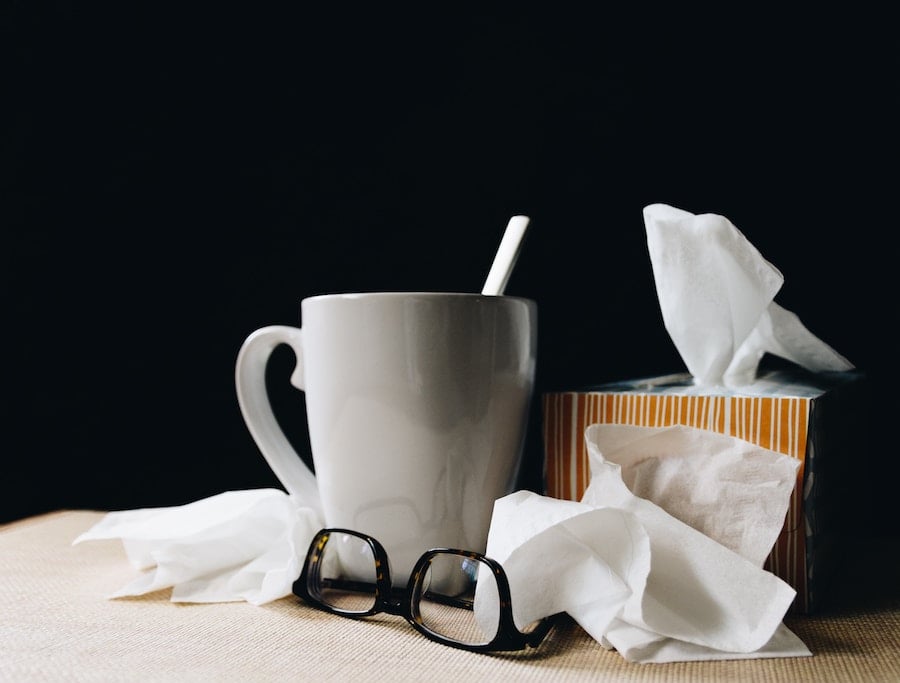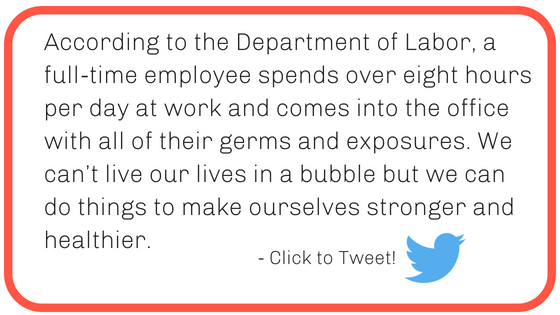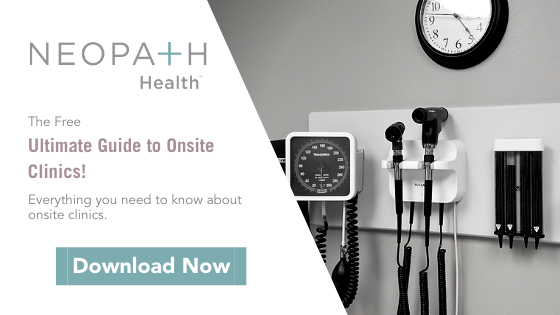Scratchy throat, congestion, fatigue, and general miserableness, in other words, you’re getting sick. On top of the initial annoyance of an inconvenient cold or flu bug, there’s the subject of blame. Who did this to you? What terrible human being made you sick?
According to the Department of Labor, a full-time employee spends over eight hours per day at work and comes into the office with all of their germs and exposures. Kids, flights, trips to the doctor, the city bus are all great chances for a virus to get into your system. Now consider that every person you work with today has encountered these or similar germ exposures and you’re spending over eight hours a day with them. You’re shaking their hands, sharing their pens, using their keyboards and phones, etc. We can’t live our lives in a bubble but we can do things to make ourselves stronger and healthier.
We know the basics of stopping the spread of office germs, right? Wash your hands after you use the bathroom and before you eat. Sneeze or cough into your elbow, not on your hand. Stay home from work when you have a fever. Eat an apple. Get a flu shot. So, assuming you’re already doing the obvious things to take care of your health and limit the spread of germs, let’s look at a few more options that can build your immunity and overall wellbeing.
Clean Your Work Area.
Your desk is filthy and you have to trust the facts. According to Entrepreneur, keyboards contain 70 percent more bacteria than a toilet seat and office phones host around 25,000 germs per square inch. Look at your hands and then read this gem: The area on your desk where your hands rest has around 10,000 bacteria. Get some antibacterial wipes and once a day before you leave or when you arrive, wipe everything down and start each day fresh.

Don't Eat at Your Desk.
This is typical advice for rookies and the newly hired. When you get your first job or start at a new company you want to create a good impression and make your work time as efficient as possible. It’s typical to think you can squeeze in a few more emails or calls if you eat lunch at your desk and skip the breakroom. But let’s go back to that information Entrepreneur was nice enough to compile for us. Office desks are more than 400 times dirtier than a toilet seat. How’s that sandwich-at-your-desk plan look now? Let’s also consider the mental health piece to your immunity. Interacting with others can help us feel more connected and less stressed.
BONUS: Check out these 8 Common Wellness Program Mistakes Companies Make!
Get Fresh Air Whenever Possible
There are so many wonderful benefits to getting fresh air including relieving stress, boosting immunity, and increasing energy levels but it also does something else for you that can help you keep sickness at a distance. Trees and plants remove pollution from the air, making it healthier for us to breathe and the fresh air created by trees is especially beneficial to those living in urban areas where the air is more heavily polluted.

Plants. Get Plants.
If you can’t actually get outside during your workday, there is another solution. The air quality (or lack of) in your environment is a real thing and poor air quality can create all sorts of health problems. Before you petition the office manager to buy an expensive air filter for the office, there might be an easier and better fix. You can actually grow fresh air, see the process researcher Kamal Meattle discovered here. Basically, you’ll want to stock up on these three plants in your home and office: Areca palm, Mother-in-Law's Tongue, and money plant. What’s great about this solution is the double benefit you’ll receive. Not only are the plants cleaning the air you breathe but the presence of nature and greenery in the office can lift your mood and spirit.
Self-Care.
Self-care is more than just treating yourself to a massage or a pedicure. Self-care is actually an adult responsibility. According to Forbes, self-care is not just about your mental health. It’s also about caring for your physical self, by eating healthy, taking adequate sleep, caring about your hygiene, exercising regularly, etc. So keep current on your doctor and dentist visits, go for a walk during your lunch break, meditate or start a journal. Finding ways to increase your mental and physical health will keep you strong when you are exposed to harmful viruses and bacteria.
.png?width=433&name=NeoPath_2019_logo_2color%20(1).png)





